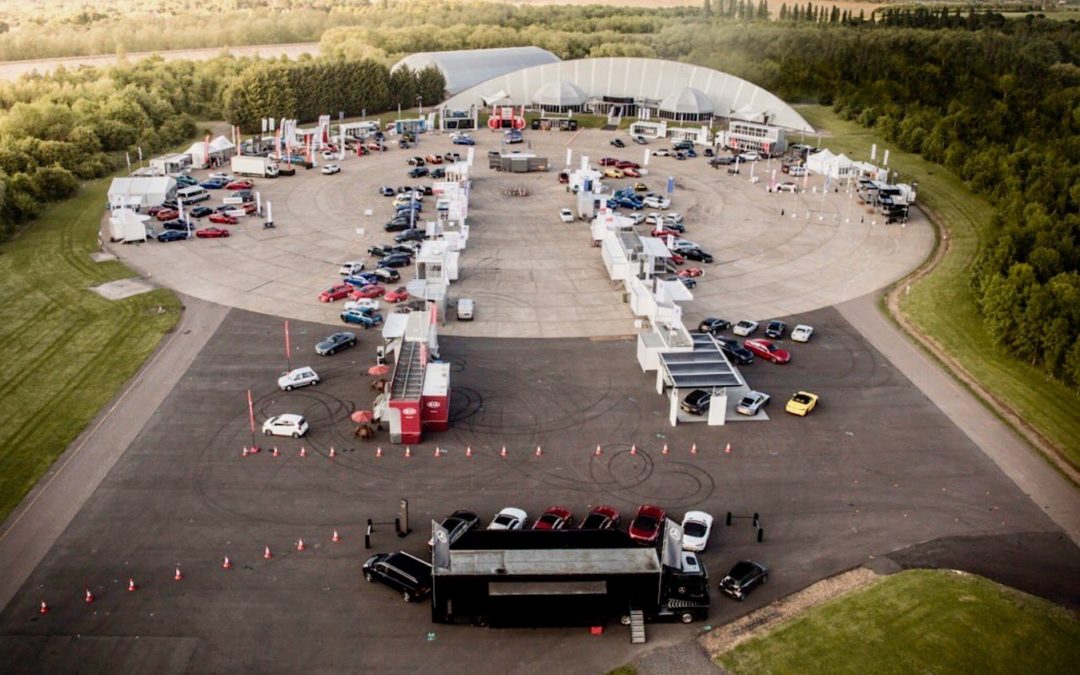The SMMT still hopes to run its 2020 driving day, eventually.
Latest is a move to 1 October, when the Government permits larger gatherings for business and sporting events.
The SMMT and Millbrook have been working on the familiar pattern for the day but it will be very different this year from the moment of arrival. In fact, before you arrive.
There will be an element of self-certification 24hrs before the event, temperature checks upon arrival and the parking area is closer to obviate the need for mini buses to transport from the straight to the meeting area.
Masks, seat covers and gloves will be provided, vehicles sanitized between bookings and there will be pre-packed refreshments and an audio-visual presentation and welcome with a one-way system used in the conference centre and that’s only open for socially distanced eating and washroom facilities.
Anyone who has Coronavirus symptoms within two weeks before or after the event on 1 October, must inform the SMMT so it can comply with Government track and trace.
Full details can be found at this special event URL
With the chaos of coronavirus catching out tens of thousands of commuters and holidaymakers I wonder if we are now going to see a new age of the car and if the industry and dealers are capable of capitalizing on it.
Public transport collapsed when the virus hit the UK in March, society retreated to home-working or no-working and only “essential” users were supposed to board buses and trains.
That killed it for airlines, holiday firms and the public transport providers and has dealt a serious blow to longer term plans such as those for the HS2 lines and Crossrail.
Social distancing introduced to reduce the possible spread of the virus meant only a few score passengers could use my local two-carriage trains and this produced very long queues at stations and bus ticket prices have soared as struggling companies try to compensate or mitigate their mounting losses.
Some Government funding has been provided but that’s really not enough to address the short term hit and permit planning for the future requirements, not helped by the fact the operators or Government don’t know what they are likely to be. Taxis cannot cope.
Where some normality has returned to our streets and out of town shopping, it’s still an odd experience with positive discrimination being carried out to deter visitors coming by car, although how you do a week’s shopping without a car has never been satisfactorily explained to me.
Parking is being actively restricted to discourage car use and this leads to longer queues to get into any available spaces and that means more airborne pollution as engines tick over for longer or grind along in slow moving traffic.
But there is something to be optimistic about as demand for used cars is soaring and I know one independent dealer who is now forced to source cars over 400 miles away from his forecourt as auctions bomb out with demand on his doorstep. Prices are very high as a result.
The upcoming 1 September registration could infact be hit by this demand for nearly new used cars and low mileage older models as the industry struggles to sell or more likely lease new models.
For many they are overpriced and I know one major finance house now facing more customer calls where they wish to end a PCP and revert to a simple Hire Purchase Agreement to finance a used car they have spotted.
It does not help that some manufacturers are actually de-specifying their newer models so they are not as comprehensively equipped as the previous series and a model from the last 12 months may be better equipped and certainly cheaper than the newcomer gleaming in the showroom behind its price ticket.
We are also told that models’ lines may be shrinking as hard pressed manufacturers cut out the slow-sellers and rationalise their platforms as they face up to the arrival of more electric models and councils clamp down on diesels, despite their better economy and cleanliness in latest versions.
Making what a buyer wants is always a better bet than trying to guess what they will pay for.
So with a shrinking new car parc and enormous used car market the retail industry could enjoy a new boom when it least expected it.
One major UK business has reportedly a stock of 100,000 unsold cars which it will probably have to drip feed into showrooms over the coming year if it’s to survive and not write them down. Auction houses are also selling low mileage delivery only cars with thousands of pounds off.
The next concern for the industry is the looming Brexit deal, if one is reached, and which will either penalise the home producers or make imports much more expensive unless an agreement is forthcoming.
Against this background we have the edging of electric cars into our economy.
I have seen some experts writing that the motor manufacturers are deliberately holding back on EV production and sales to keep up emission levels overall so they will not have to meet even tougher output targets in a couple of years if more EVs would be in their mix and driving down emissions today.
So if you cannot get the new car you want at a price you’re willing to pay, the used car market is now very tempting to tickle and trade into.
Robin Roberts
Chairman WGMW
Robin is the longest serving chairman of The Western Group. He's been vice chairman or chairman for over ten years and oversees the annual Western Group PR Driving Day each summer assisted by the group committee and supported by group members.
He contributes to a number of outlets in Wales and the UK, including the Driving Force editorial syndication agency feeding the biggest regional news and feature publishers in Britain.
Robin specialises in the Welsh automotive sector and motor related businesses with interests in Wales and publishes WheelsWithinWales.uk which covers news, features, trade and motor sport in Wales.

